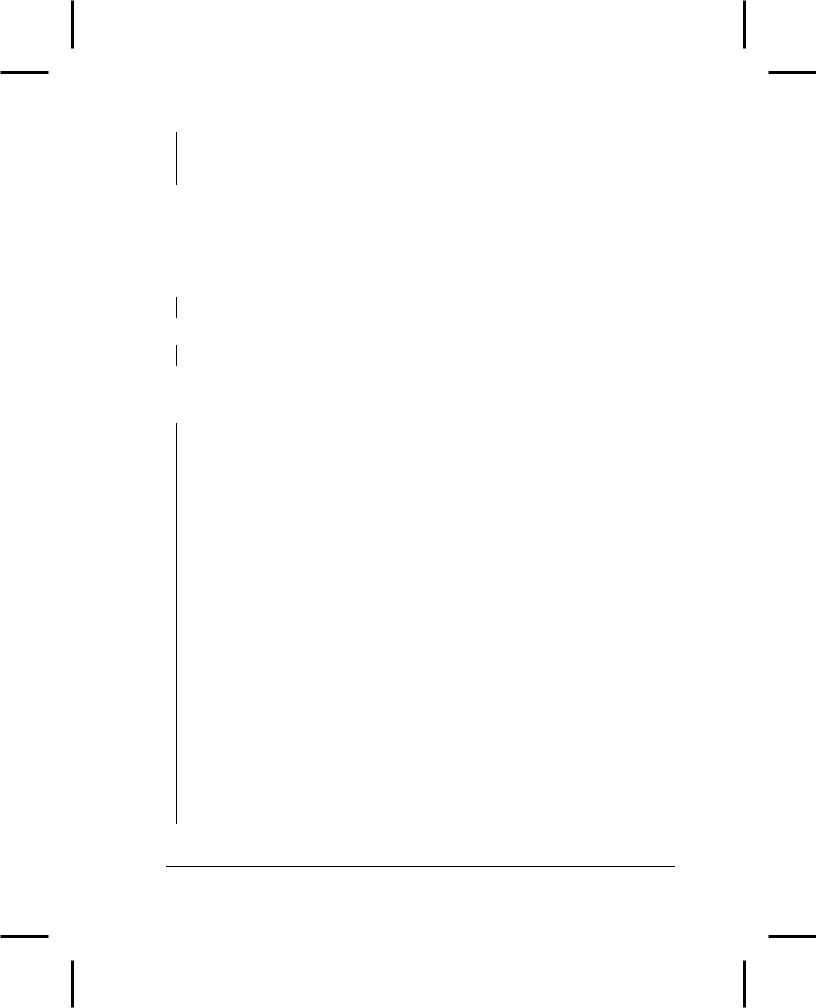
- •Thinking in C++ 2nd edition Volume 2: Standard Libraries & Advanced Topics
- •Preface
- •What’s new in the second edition
- •What’s in Volume 2 of this book
- •How to get Volume 2
- •Prerequisites
- •Learning C++
- •Goals
- •Chapters
- •Exercises
- •Exercise solutions
- •Source code
- •Language standards
- •Language support
- •The book’s CD ROM
- •Seminars, CD Roms & consulting
- •Errors
- •Acknowledgements
- •Library overview
- •1: Strings
- •What’s in a string
- •Creating and initializing C++ strings
- •Initialization limitations
- •Operating on strings
- •Appending, inserting and concatenating strings
- •Replacing string characters
- •Concatenation using non-member overloaded operators
- •Searching in strings
- •Finding in reverse
- •Finding first/last of a set
- •Removing characters from strings
- •Stripping HTML tags
- •Comparing strings
- •Using iterators
- •Iterating in reverse
- •Strings and character traits
- •A string application
- •Summary
- •Exercises
- •2: Iostreams
- •Why iostreams?
- •True wrapping
- •Iostreams to the rescue
- •Sneak preview of operator overloading
- •Inserters and extractors
- •Manipulators
- •Common usage
- •Line-oriented input
- •Overloaded versions of get( )
- •Reading raw bytes
- •Error handling
- •File iostreams
- •Open modes
- •Iostream buffering
- •Seeking in iostreams
- •Creating read/write files
- •User-allocated storage
- •Output strstreams
- •Automatic storage allocation
- •Proving movement
- •A better way
- •Output stream formatting
- •Internal formatting data
- •Format fields
- •Width, fill and precision
- •An exhaustive example
- •Formatting manipulators
- •Manipulators with arguments
- •Creating manipulators
- •Effectors
- •Iostream examples
- •Code generation
- •Maintaining class library source
- •Detecting compiler errors
- •A simple datalogger
- •Generating test data
- •Verifying & viewing the data
- •Counting editor
- •Breaking up big files
- •Summary
- •Exercises
- •3: Templates in depth
- •Nontype template arguments
- •Typedefing a typename
- •Using typename instead of class
- •Function templates
- •A string conversion system
- •A memory allocation system
- •Type induction in function templates
- •Taking the address of a generated function template
- •Local classes in templates
- •Applying a function to an STL sequence
- •Template-templates
- •Member function templates
- •Why virtual member template functions are disallowed
- •Nested template classes
- •Template specializations
- •A practical example
- •Pointer specialization
- •Partial ordering of function templates
- •Design & efficiency
- •Preventing template bloat
- •Explicit instantiation
- •Explicit specification of template functions
- •Controlling template instantiation
- •Template programming idioms
- •Summary
- •Containers and iterators
- •STL reference documentation
- •The Standard Template Library
- •The basic concepts
- •Containers of strings
- •Inheriting from STL containers
- •A plethora of iterators
- •Iterators in reversible containers
- •Iterator categories
- •Input: read-only, one pass
- •Output: write-only, one pass
- •Forward: multiple read/write
- •Bidirectional: operator--
- •Random-access: like a pointer
- •Is this really important?
- •Predefined iterators
- •IO stream iterators
- •Manipulating raw storage
- •Basic sequences: vector, list & deque
- •Basic sequence operations
- •vector
- •Cost of overflowing allocated storage
- •Inserting and erasing elements
- •deque
- •Converting between sequences
- •Cost of overflowing allocated storage
- •Checked random-access
- •list
- •Special list operations
- •list vs. set
- •Swapping all basic sequences
- •Robustness of lists
- •Performance comparison
- •A completely reusable tokenizer
- •stack
- •queue
- •Priority queues
- •Holding bits
- •bitset<n>
- •vector<bool>
- •Associative containers
- •Generators and fillers for associative containers
- •The magic of maps
- •A command-line argument tool
- •Multimaps and duplicate keys
- •Multisets
- •Combining STL containers
- •Creating your own containers
- •Summary
- •Exercises
- •5: STL Algorithms
- •Function objects
- •Classification of function objects
- •Automatic creation of function objects
- •Binders
- •Function pointer adapters
- •SGI extensions
- •A catalog of STL algorithms
- •Support tools for example creation
- •Filling & generating
- •Example
- •Counting
- •Example
- •Manipulating sequences
- •Example
- •Searching & replacing
- •Example
- •Comparing ranges
- •Example
- •Removing elements
- •Example
- •Sorting and operations on sorted ranges
- •Sorting
- •Example
- •Locating elements in sorted ranges
- •Example
- •Merging sorted ranges
- •Example
- •Set operations on sorted ranges
- •Example
- •Heap operations
- •Applying an operation to each element in a range
- •Examples
- •Numeric algorithms
- •Example
- •General utilities
- •Creating your own STL-style algorithms
- •Summary
- •Exercises
- •Perspective
- •Duplicate subobjects
- •Ambiguous upcasting
- •virtual base classes
- •The "most derived" class and virtual base initialization
- •"Tying off" virtual bases with a default constructor
- •Overhead
- •Upcasting
- •Persistence
- •MI-based persistence
- •Improved persistence
- •Avoiding MI
- •Mixin types
- •Repairing an interface
- •Summary
- •Exercises
- •7: Exception handling
- •Error handling in C
- •Throwing an exception
- •Catching an exception
- •The try block
- •Exception handlers
- •Termination vs. resumption
- •The exception specification
- •Better exception specifications?
- •Catching any exception
- •Rethrowing an exception
- •Uncaught exceptions
- •Function-level try blocks
- •Cleaning up
- •Constructors
- •Making everything an object
- •Exception matching
- •Standard exceptions
- •Programming with exceptions
- •When to avoid exceptions
- •Not for asynchronous events
- •Not for ordinary error conditions
- •Not for flow-of-control
- •You’re not forced to use exceptions
- •New exceptions, old code
- •Typical uses of exceptions
- •Always use exception specifications
- •Start with standard exceptions
- •Nest your own exceptions
- •Use exception hierarchies
- •Multiple inheritance
- •Catch by reference, not by value
- •Throw exceptions in constructors
- •Don’t cause exceptions in destructors
- •Avoid naked pointers
- •Overhead
- •Summary
- •Exercises
- •8: Run-time type identification
- •The “Shape” example
- •What is RTTI?
- •Two syntaxes for RTTI
- •Syntax specifics
- •Producing the proper type name
- •Nonpolymorphic types
- •Casting to intermediate levels
- •void pointers
- •Using RTTI with templates
- •References
- •Exceptions
- •Multiple inheritance
- •Sensible uses for RTTI
- •Revisiting the trash recycler
- •Mechanism & overhead of RTTI
- •Creating your own RTTI
- •Explicit cast syntax
- •Summary
- •Exercises
- •9: Building stable systems
- •Shared objects & reference counting
- •Reference-counted class hierarchies
- •Finding memory leaks
- •An extended canonical form
- •Exercises
- •10: Design patterns
- •The pattern concept
- •The singleton
- •Variations on singleton
- •Classifying patterns
- •Features, idioms, patterns
- •Basic complexity hiding
- •Factories: encapsulating object creation
- •Polymorphic factories
- •Abstract factories
- •Virtual constructors
- •Destructor operation
- •Callbacks
- •Observer
- •The “interface” idiom
- •The “inner class” idiom
- •The observer example
- •Multiple dispatching
- •Visitor, a type of multiple dispatching
- •Efficiency
- •Flyweight
- •The composite
- •Evolving a design: the trash recycler
- •Improving the design
- •“Make more objects”
- •A pattern for prototyping creation
- •Trash subclasses
- •Parsing Trash from an external file
- •Recycling with prototyping
- •Abstracting usage
- •Applying double dispatching
- •Implementing the double dispatch
- •Applying the visitor pattern
- •More coupling?
- •RTTI considered harmful?
- •Summary
- •Exercises
- •11: Tools & topics
- •The code extractor
- •Debugging
- •Trace macros
- •Trace file
- •Abstract base class for debugging
- •Tracking new/delete & malloc/free
- •CGI programming in C++
- •Encoding data for CGI
- •The CGI parser
- •Testing the CGI parser
- •Using POST
- •Handling mailing lists
- •Maintaining your list
- •Mailing to your list
- •A general information-extraction CGI program
- •Parsing the data files
- •Summary
- •Exercises
- •General C++
- •My own list of books
- •Depth & dark corners
- •Design Patterns
- •Index

int main(int argc, char* argv[]) { requireArgs(argc, 1);
FileEditor file(argv[1]);
// Do something to the lines...
int i = 1;
FileEditor::iterator w = file.begin(); while(w != file.end()) {
ostringstream ss; ss << i++;
*w = ss.str() + ": " + *w; w++;
}
// Now send them to cout: file.write();
} ///:~
Now the operation of reading the file is in the constructor:
FileEditor file(argv[1]);
and writing happens in the single line (which defaults to sending the output to cout):
file.write();
The bulk of the program is involved with actually modifying the file in memory.
A plethora of iterators
As mentioned earlier, the iterator is the abstraction that allows a piece of code to be generic, and to work with different types of containers without knowing the underlying structure of those containers. Every container produces iterators. You must always be able to say:
ContainerType::iterator
ContainerType::const_iterator
to produce the types of the iterators produced by that container. Every container has a begin( ) method that produces an iterator indicating the beginning of the elements in the container, and an end( ) method that produces an iterator which is the as the past-the-end value of the container. If the container is const¸ begin( ) and end( ) produce const iterators.
Every iterator can be moved forward to the next element using the operator++ (an iterator may be able to do more than this, as you shall see, but it must at least support forward movement with operator++).
The basic iterator is only guaranteed to be able to perform == and != comparisons. Thus, to move an iterator it forward without running it off the end you say something like:
while(it != pastEnd) {
Chapter 15: Multiple Inheritance
159

// Do something it++;
}
Where pastEnd is the past-the-end value produced by the container’s end( ) member function.
An iterator can be used to produce the element that it is currently selecting within a container by dereferencing the iterator. This can take two forms. If it is an iterator and f( ) is a member function of the objects held in the container that the iterator is pointing within, then you can say either:
(*it).f();
or
it->f();
Knowing this, you can create a template that works with any container. Here, the apply( ) function template calls a member function for every object in the container, using a pointer to member that is passed as an argument:
//: C04:Apply.cpp
// Using basic iterators #include <iostream> #include <vector> #include <iterator> using namespace std;
template<class Cont, class PtrMemFun> void apply(Cont& c, PtrMemFun f) {
typename Cont::iterator it = c.begin(); while(it != c.end()) {
(it->*f)(); // Compact form ((*it).*f)(); // Alternate form it++;
}
}
class Z { int i;
public:
Z(int ii) : i(ii) {} void g() { i++; } friend ostream&
operator<<(ostream& os, const Z& z) { return os << z.i;
Chapter 15: Multiple Inheritance
160

}
};
int main() {
ostream_iterator<Z> out(cout, " "); vector<Z> vz;
for(int i = 0; i < 10; i++) vz.push_back(Z(i));
copy(vz.begin(), vz.end(), out); cout << endl;
apply(vz, &Z::g); copy(vz.begin(), vz.end(), out);
} ///:~
Because operator-> is defined for STL iterators, it can be used for pointer-to-member dereferencing (in the following chapter you’ll learn a more elegant way to handle the problem of applying a member function or ordinary function to every object in a container).
Much of the time, this is all you need to know about iterators – that they are produced by begin( ) and end( ), and that you can use them to move through a container and select elements. Many of the problems that you solve, and the STL algorithms (covered in the next chapter) will allow you to just flail away with the basics of iterators. However, things can at times become more subtle, and in those cases you need to know more about iterators. The rest of this section gives you the details.
Iterators in reversible containers
All containers must produce the basic iterator. A container may also be reversible, which means that it can produce iterators that move backwards from the end, as well as the iterators that move forward from the beginning.
A reversible container has the methods rbegin( ) (to produce a reverse_iterator selecting the end) and rend( ) (to produce a reverse_iterator indicating “one past the beginning”). If the container is const then rbegin( ) and rend( ) will produce const_reverse_iterators.
All the basic sequence containers vector, deque and list are reversible containers. The following example uses vector, but will work with deque and list as well:
//: C04:Reversible.cpp
// Using reversible containers #include "../require.h" #include <vector>
#include <iostream> #include <fstream> #include <string> using namespace std;
Chapter 15: Multiple Inheritance
161
